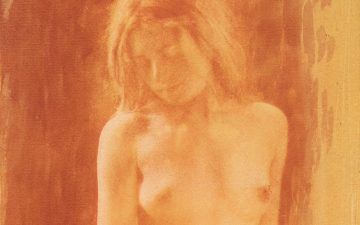Jamie Mackay in Aeon:
 A woman rests in a field surrounded by apple trees. Savouring the sounds and smells of the shaded grove, she muses on the ‘sacred recess’ of her idyllic surroundings, and surrenders herself to fantasy. The wind is ‘honey sweet’, the air perfumed with ‘musk roses’. She is waiting for a lover. ‘Come to me from Crete,’ our narrator calls out to an anonymous and distant figure. Her words are charged with desire. ‘Ice-water babbles’ among ‘flickering leafage’ while ‘horses’ – a traditional symbol of masculine virility – ‘graze knee-deep in flowers’. What has triggered this outpour of erotic yearning? Are these the daydreams of a hot summer’s day? Is the subject drunk, as her eulogising of the local ‘nectar’ might suggest? Might she even, as some critics have speculated, be masturbating?
A woman rests in a field surrounded by apple trees. Savouring the sounds and smells of the shaded grove, she muses on the ‘sacred recess’ of her idyllic surroundings, and surrenders herself to fantasy. The wind is ‘honey sweet’, the air perfumed with ‘musk roses’. She is waiting for a lover. ‘Come to me from Crete,’ our narrator calls out to an anonymous and distant figure. Her words are charged with desire. ‘Ice-water babbles’ among ‘flickering leafage’ while ‘horses’ – a traditional symbol of masculine virility – ‘graze knee-deep in flowers’. What has triggered this outpour of erotic yearning? Are these the daydreams of a hot summer’s day? Is the subject drunk, as her eulogising of the local ‘nectar’ might suggest? Might she even, as some critics have speculated, be masturbating?
For all the distractions of our contemporary lives, reading Sappho today remains just as exhilarating as it was 2,000 years ago when, as one of the foremost poets of the ancient world, her poems were widely anthologised. Her delicate style, her withholding of details and delaying of pleasure, has drawn admiration from such canonical figures as Charles Baudelaire and A C Swinburne, even Oscar Wilde, who trilled ‘never had Love such a singer’.
Sappho’s restraint remains strangely gratifying today, when sexuality is so intensely visual, imposed top-down through the peculiar marriage of pornography and pop culture.
More here.
